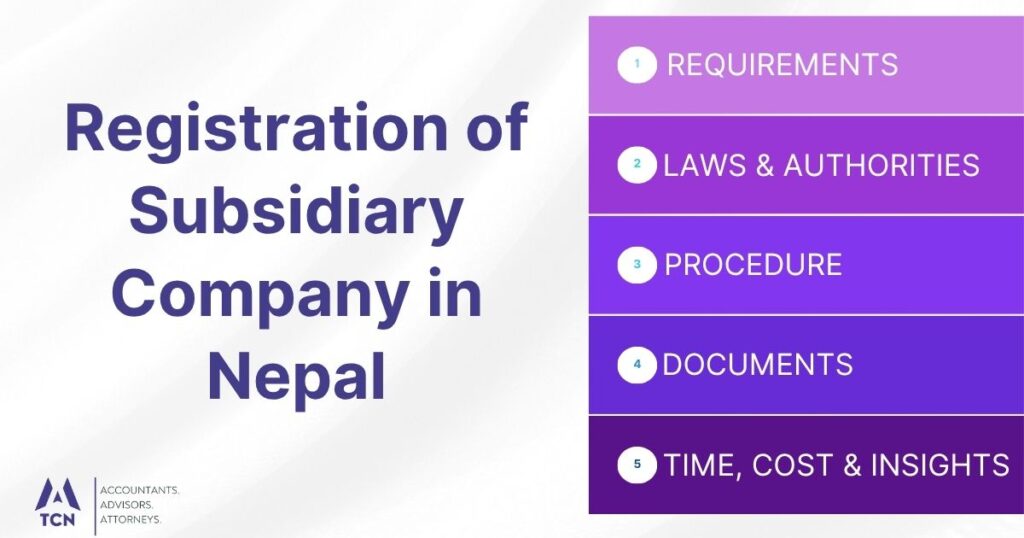Introduction and Overview of Subsidiary Company Registration
Nepal has emerged as an attractive destination for foreign direct investment (FDI), offering significant opportunities for international businesses to establish subsidiary companies. A subsidiary company represents a separate legal entity controlled by a parent company, typically holding more than 50% ownership stake. The Government of Nepal actively encourages foreign investment through various policies and streamlined registration processes.
The Foreign Investment and Technology Transfer Act (FITTA) 2019 serves as the primary legislation governing foreign investment in Nepal. This comprehensive framework facilitates the establishment of subsidiary companies while ensuring compliance with national economic policies. The Department of Industry (DOI) acts as the central authority for processing foreign investment applications and subsidiary company registrations.
Foreign investors can establish subsidiary companies across various sectors, including manufacturing, services, tourism, and technology. The Nepal Investment Board (NIB) oversees large-scale investments exceeding NPR 6 billion, while smaller investments fall under DOI jurisdiction. The Company Act 2063 provides the fundamental legal structure for company incorporation and governance in Nepal.
The subsidiary company registration process involves multiple regulatory bodies, including the Office of Company Registrar (OCR), Department of Industry, Nepal Rastra Bank, and relevant municipal authorities. Understanding these requirements ensures smooth business establishment and legal compliance throughout the operational lifecycle.
Legal Requirements for Subsidiary Company Registration
Minimum Capital Requirements
The Foreign Investment and Technology Transfer Act 2019 establishes specific minimum capital requirements for foreign subsidiary companies. Manufacturing industries require a minimum foreign investment of NPR 50 million, while service sector companies need NPR 20 million minimum investment. These thresholds ensure substantial commitment from foreign investors while promoting meaningful economic contribution.
The Nepal Rastra Bank Directive mandates that foreign currency investments must be converted through authorized banking channels. All capital contributions require proper documentation, including bank certificates and foreign exchange conversion records. The invested capital must remain in Nepal for the project’s operational period as specified in the investment agreement.
Sectoral Restrictions and Permissions
Nepal maintains certain sectoral restrictions for foreign investment, as outlined in the Foreign Investment Policy 2015. Industries reserved exclusively for Nepali citizens include retail trading below specified thresholds, personal services, and certain agricultural activities. The Industrial Policy 2010 provides comprehensive guidelines regarding permissible foreign investment sectors.
Strategic sectors such as telecommunications, banking, and hydropower require special approvals from respective regulatory authorities. The Nepal Telecommunications Authority, Nepal Rastra Bank, and Department of Electricity Development govern these specialized sectors respectively.
Corporate Governance Requirements
Subsidiary companies must comply with corporate governance standards established under the Company Act 2063. The Act mandates appointment of local directors, with at least one Nepali citizen serving on the board of directors. Companies must maintain proper books of accounts, conduct annual audits, and file regular compliance reports with regulatory authorities.
Detailed Registration Process for Subsidiary Companies
Step 1: Obtain Foreign Investment Approval
The registration process begins with securing foreign investment approval from the Department of Industry or Nepal Investment Board, depending on investment size. Investors must submit a comprehensive project proposal including business plan, financial projections, and technical specifications. The FITTA 2019 requires detailed documentation of the parent company’s financial capacity and business credentials.
The application must specify the proposed investment amount, business activities, employment generation plans, and technology transfer components. DOI evaluates applications based on economic impact, environmental considerations, and alignment with national development priorities. The approval process typically involves site verification and stakeholder consultations.
Upon approval, investors receive a Foreign Investment Approval Certificate valid for two years. This certificate authorizes the establishment of subsidiary company and serves as the foundation for subsequent registration procedures. Extensions may be granted upon justified requests and compliance with original terms.
Step 2: Reserve Company Name
Company name reservation represents the second crucial step in subsidiary registration. The Office of Company Registrar maintains a centralized database of registered company names to prevent duplication. Applicants must propose three alternative names following the naming conventions specified in the Company Act 2063.
The proposed names must include appropriate suffixes such as “Private Limited” or “Limited” and cannot conflict with existing trademarks or registered companies. Names suggesting government affiliation or using restricted terms require special permissions. The OCR conducts thorough searches to ensure name availability and appropriateness.
Name reservation remains valid for 60 days, providing sufficient time for completing remaining registration procedures. The reserved name cannot be transferred to other parties and expires automatically if registration is not completed within the specified timeframe.
Step 3: Prepare and Submit Incorporation Documents
Document preparation involves compiling comprehensive incorporation papers as mandated by the Company Act 2063. The Memorandum of Association defines the company’s objectives, authorized capital, and fundamental structure. The Articles of Association establish internal governance rules, director powers, and operational procedures.
All foreign documents require authentication through the respective embassy or consulate and subsequent verification by the Ministry of Foreign Affairs, Nepal. Translation into Nepali language by certified translators is mandatory for all foreign language documents. The Company Registrar maintains strict documentation standards to ensure legal compliance.
Incorporation documents must be signed by all founding members and witnessed by authorized personnel. The application package includes prescribed forms, supporting documents, and applicable fees as specified in the Company Registration Fee Schedule.
Step 4: Capital Verification and Bank Account Opening
Capital verification involves opening a preliminary bank account and depositing the minimum required capital. The Nepal Rastra Bank Unified Directive governs foreign currency transactions and capital repatriation procedures. Authorized commercial banks facilitate foreign investment transactions and provide necessary certification.
The bank issues a Capital Verification Certificate confirming the deposit of minimum required capital. This certificate serves as proof of financial capacity and commitment to the proposed investment. The deposited amount remains frozen until company registration completion and regulatory approvals.
Foreign investors must comply with foreign exchange regulations and maintain proper documentation of all currency transactions. The Foreign Exchange Management Act provides the legal framework for foreign currency operations and repatriation procedures.
Step 5: Complete Final Registration and Obtain Certificates
The final registration step involves submitting all prepared documents to the Office of Company Registrar along with applicable fees. The Company Act 2063 mandates thorough document verification and compliance checking before certificate issuance. The registration process includes publication in the Nepal Gazette for public notification.
Upon successful verification, the Company Registrar issues the Certificate of Incorporation, establishing the subsidiary company as a legal entity. This certificate enables the company to commence business operations, open operational bank accounts, and enter into legal contracts.
The newly incorporated subsidiary must obtain additional licenses and permits specific to its business activities. Sector-specific approvals from relevant ministries and departments are mandatory before commencing commercial operations.
Required Documents for Subsidiary Company Registration
Parent Company Documentation
Foreign parent companies must provide comprehensive documentation establishing their legal status and financial capacity. The Certificate of Incorporation from the country of origin, duly authenticated and translated, serves as primary evidence of corporate existence. Recent financial statements, audited by certified public accountants, demonstrate the parent company’s financial stability and investment capacity.
Board resolutions authorizing subsidiary establishment and capital investment require proper authentication through diplomatic channels. The Power of Attorney appointing local representatives must comply with Nepali legal requirements and include specific authorization for company registration activities.
Shareholder and Director Information
Complete biographical information of all shareholders and proposed directors is mandatory under the Company Act 2063. This includes passport copies, residential addresses, professional qualifications, and character certificates from relevant authorities. Nepali directors must provide citizenship certificates and recent photographs.
The Foreign Investment and Technology Transfer Act requires disclosure of ultimate beneficial ownership for transparency and compliance purposes. All foreign nationals involved in the subsidiary must possess valid visas and work permits as applicable.
Financial and Technical Documents
Detailed project reports outlining business objectives, market analysis, and financial projections are essential components of the application package. The Department of Industry evaluates these documents to assess project viability and economic impact. Environmental impact assessments may be required for certain industrial projects.
Technology transfer agreements, if applicable, must comply with the Technology Transfer Guidelines and include detailed specifications of transferred technology. Licensing agreements and technical collaboration documents require proper authentication and regulatory approval.
Time Frame and Associated Costs
Registration Timeline
The subsidiary company registration process typically requires 45-60 working days from application submission to certificate issuance. The Department of Industry processes foreign investment approvals within 30 days for standard applications. Complex projects or those requiring environmental clearances may extend beyond standard timelines.
Name reservation takes 3-5 working days, while document preparation and authentication may require 2-3 weeks depending on the country of origin. The Office of Company Registrar completes final registration within 15 working days after receiving complete documentation.
Cost Structure
Registration costs vary based on authorized capital and business activities. The Company Registration Fee Schedule establishes standard fees ranging from NPR 1,000 to NPR 100,000 depending on capital structure. Foreign investment approval fees are calculated as a percentage of proposed investment, typically 0.1% to 0.5%.
Additional costs include document authentication, translation services, legal consultation, and bank charges. Professional service fees for legal and consulting services range from NPR 50,000 to NPR 200,000 depending on project complexity.
Government Fee Structure
The Department of Industry charges foreign investment approval fees based on investment size and sector. Manufacturing projects pay lower rates compared to service sector investments. The Nepal Investment Board applies different fee structures for large-scale investments exceeding NPR 6 billion.
Municipal registration fees and local permits add to the overall cost structure. These fees vary by location and business type, typically ranging from NPR 5,000 to NPR 25,000 annually.
Post-Registration Compliance Obligations
Annual Compliance Requirements
Registered subsidiary companies must fulfill various annual compliance obligations under Nepali law. The Company Act 2063 mandates annual general meetings, board meetings, and filing of annual returns with the Company Registrar. Financial statements require auditing by chartered accountants registered with the Institute of Chartered Accountants of Nepal.
Tax compliance involves filing annual income tax returns with the Inland Revenue Department and maintaining proper accounting records. The Income Tax Act 2058 establishes tax obligations and filing requirements for corporate entities.
Regulatory Reporting
Foreign-invested companies must submit periodic reports to the Department of Industry regarding business operations, employment, and investment utilization. The Foreign Investment and Technology Transfer Act requires annual progress reports and compliance certificates.
Operational Permits and Licenses
Subsidiary companies must obtain sector-specific licenses and permits before commencing operations. Manufacturing companies require industrial licenses, environmental clearances, and safety certifications. Service companies need relevant professional licenses and municipal permits.
The Labor Act 2074 governs employment relationships and requires compliance with labor standards, social security contributions, and worker safety regulations. Companies must register with the Department of Labor and maintain proper employment records.
Frequently Asked Questions
What is the minimum capital requirement for establishing a subsidiary company in Nepal? Manufacturing industries require NPR 50 million minimum foreign investment, while service sectors need NPR 20 million. These amounts must be deposited in authorized banks with proper documentation and verification certificates.
How long does the subsidiary company registration process take in Nepal? The complete registration process typically takes 45-60 working days from application submission. This includes foreign investment approval, name reservation, document preparation, and final registration with the Company Registrar.
Where should foreign investors submit their subsidiary company registration applications? Applications are submitted to the Department of Industry for investments below NPR 6 billion, or Nepal Investment Board for larger investments. Final registration occurs at the Office of Company Registrar.
What are the essential requirements for foreign subsidiary company registration in Nepal? Key requirements include foreign investment approval, minimum capital deposit, local director appointment, authenticated parent company documents, and compliance with sectoral regulations and environmental clearances where applicable.
What are the total costs involved in registering a subsidiary company in Nepal? Total costs range from NPR 200,000 to NPR 500,000, including government fees, professional services, document authentication, translation, and bank charges, varying based on capital size and complexity.


